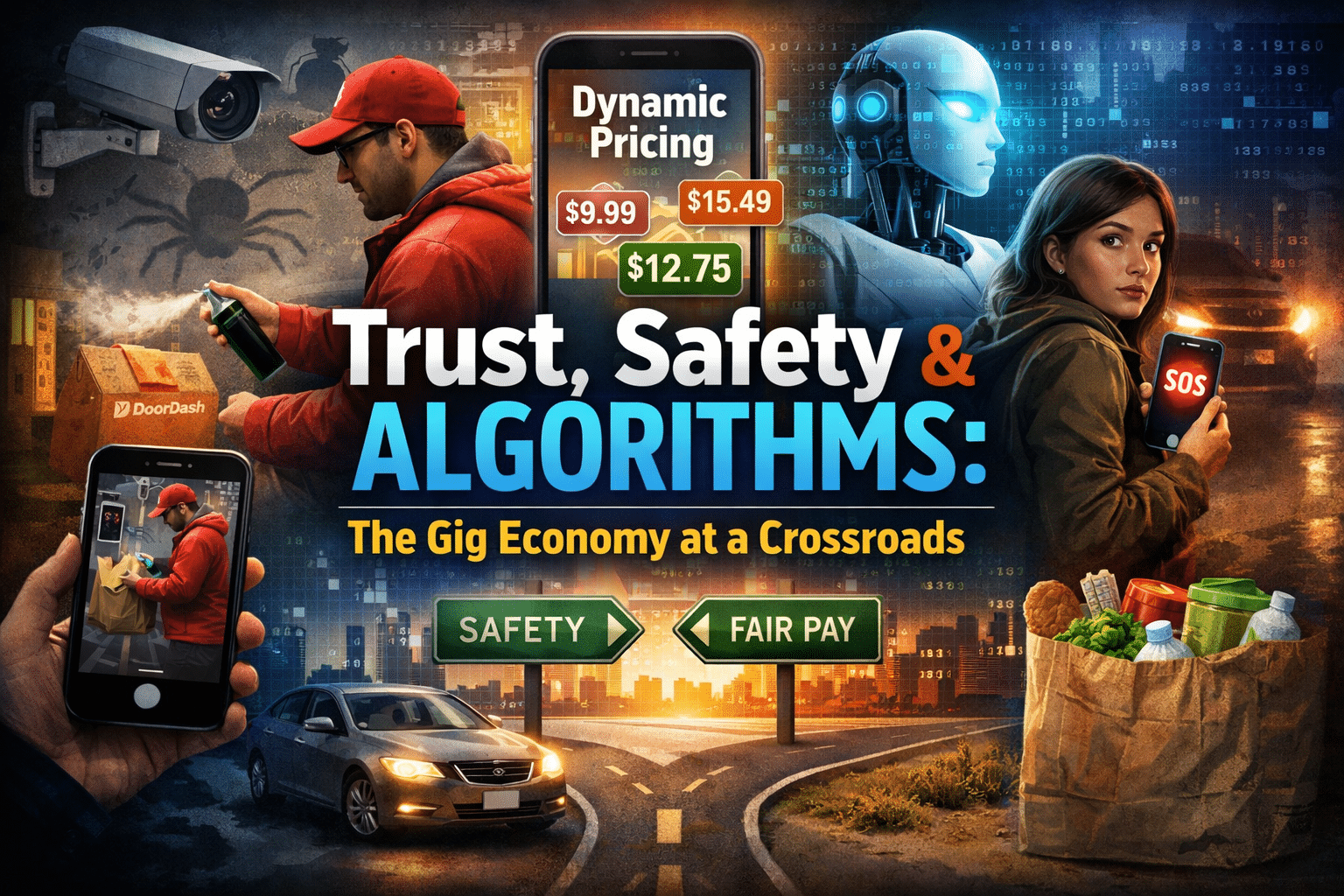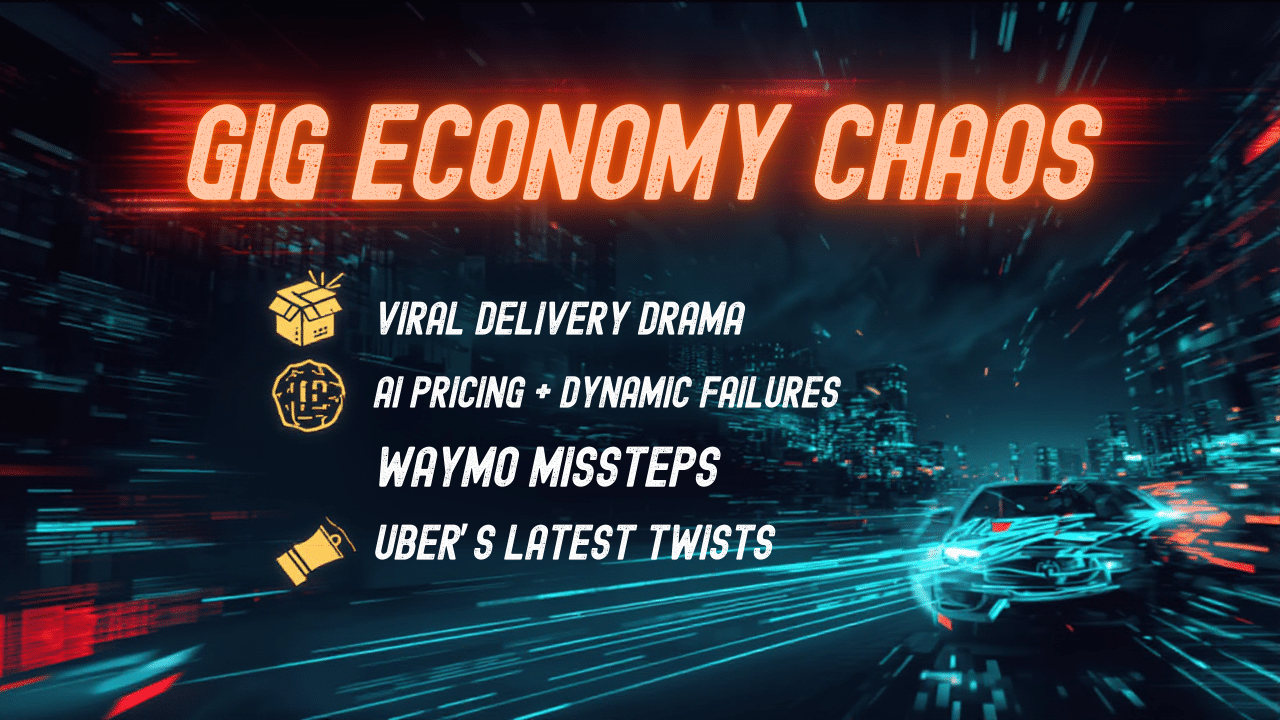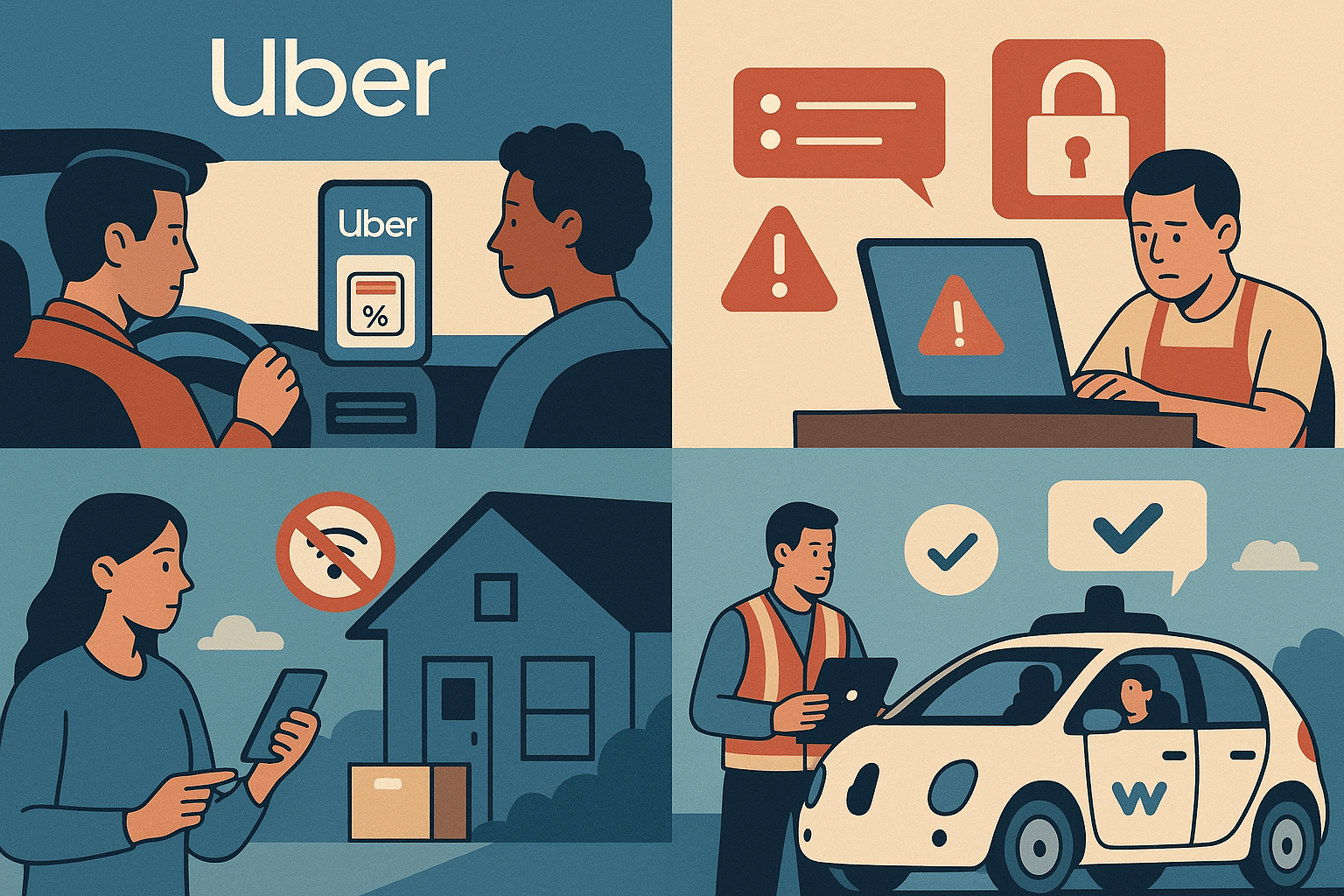by Jason Tieri | Dec 29, 2025 | Podcasts
Everything Gig Economy Podcast Related: https://gigeconomyshow.com/
Download the Audio Podcast: https://thegigeconomypodcast.buzzsprout.com
Love the show? You now have the opportunity to support the show with some great rewards by becoming a Patron. Tier #2 we offer free merch, an Extra in-depth podcast per month, and an NSFW pre-show https://www.patreon.com/thegigeconpodcast
Newsletter link: https://bit.ly/gigeconomynewsletter
Octopus is a mobile entertainment tablet for your riders. Earn 100.00 per month for having the tablet in your car! No cost for the driver!
https://playoctopus.page.link/HD2FBKJzFqRR35YE9
Community Facebook Group: https://www.facebook.com/groups/451789943399295/
The Gig Economy Podcast Group Download Telegram 1st, then click on the link to join. https://t.me/joinchat/R42wUR2QGhCi2gBD
TikTok: https://www.tiktok.com/@gigeconomypodcast?
Subscribe on Youtube https://www.youtube.com/channel/UCK_bV7j7o1BzWtB4mt_4R8Q?view_as=subscriber
This podcast is produced by Hey Guys Media Group LLC http://www.heyguysmediagroup.com
Want to start your own podcast? Reach out to them today!

by Jason Tieri | Dec 22, 2025 | Blog
Download the show here!
The gig economy thrives on flexibility, speed, and trust. That trust was tested by a viral delivery clip showing a DoorDash driver spraying a customer’s bag, then blaming a spider. Beyond the shock, the moment exposes two realities: first, the public’s reliance on cameras as truth-tellers; second, how fragile customer confidence becomes when a few bad actors poison the well. We discuss why platforms should respond with decisive bans, shared safety signals across apps, and clearer escalation paths for customers and workers. Punishing deliberate harm protects everyone and raises the bar for professional standards without crushing genuine, hardworking drivers.
That story flows into a larger discussion on safety. Delivery and rideshare can be isolating and dangerous, with incidents ranging from carjackings to abductions. Features like in-app location sharing and check-ins help, but they often act too late. Real safety lives in proactive habits: controlled approach to doors, avoiding blind entryways, keeping distance at thresholds, scanning for cameras and lights, and trusting gut signals. For women working nights and anyone delivering to unfamiliar areas, small rules—like sending a quick ETA to a trusted contact, sticking to well-lit drop spots, and avoiding enclosed porches—stack up to real protection. On platform side, faster “SOS” routing, tighter verification, and cross-app bans for violent behavior would deter predators who hop between services after suspensions.
From safety to pricing, we unpack Consumer Reports’ findings on Instacart’s AI-enabled pricing, where the same items can cost different amounts for different users. That’s dynamic pricing migrating from rideshare to groceries. It’s not just surge; it’s behavioral pricing based on patterns, location, and willingness to pay. The result is confusion, distrust, and a sense that the ground is moving under customers’ feet. Transparency is the cure: standardized price bands, receipts showing store price vs. service premium, and clear explanations of fees. If the algorithms know you, you deserve to know the rules. It’s better business, too—few things erode loyalty faster than guessing games at checkout.
We also examine how AI assistants might overwhelm siloed apps. Imagine telling a smart browser to “find the lowest total cost, fastest delivery for this list,” and it comparison-shops stores, fees, and couriers in seconds. That could de-rank overpriced platforms and elevate nimble local options with fair pricing and solid reviews. For workers, it could redirect demand to the places that pay consistently and don’t play shell games with tips. But there’s a catch: AI tends to “agree” with the prompt. You need to ask the right questions—total cost vs. base price, speed vs. reliability, and safety of pickup points—so the results serve your real goals, not just the cheapest line item.
Policy fights in New York add fuel to the tipping debate. If tips move post-delivery and become less prominent, earnings fall toward the guaranteed floor, not the historic averages. Pre-checkout tip prompts with clear defaults keep the social norm intact and stabilize pay. Over time, the platforms will chase clarity and trust because those win customer and worker retention. The bolder proposal we explore is city-level limits on active drivers to reduce oversaturation, lift offer quality, and reduce data costs—potentially allowing higher per-order pay. It’s controversial, but a pilot could reveal whether scarcity leads to healthier pay without crushing access.
Finally, the human piece. Gig work can feel lonely. Community spaces—Telegram groups, live streams, and Patreons—give people a place to swap routes, vent about bad nights, and crowdsource fixes. That support turns a solitary grind into a shared craft. Whether you’re navigating late-night drop-offs, rejecting bad substitutions, or testing new AI tools, a trusted circle makes you smarter and safer. Pair that with realistic expectations about earnings, strict personal safety rules, and a healthy skepticism of algorithmic fog, and you’ll build a durable gig playbook for 2025.

by Jason Tieri | Dec 22, 2025 | Podcasts
Everything Gig Economy Podcast Related: https://gigeconomyshow.com/
Download the Audio Podcast: https://thegigeconomypodcast.buzzsprout.com
Love the show? You now have the opportunity to support the show with some great rewards by becoming a Patron. Tier #2 we offer free merch, an Extra in-depth podcast per month, and an NSFW pre-show https://www.patreon.com/thegigeconpodcast
Newsletter link: https://bit.ly/gigeconomynewsletter
Octopus is a mobile entertainment tablet for your riders. Earn 100.00 per month for having the tablet in your car! No cost for the driver!
https://playoctopus.page.link/HD2FBKJzFqRR35YE9
Community Facebook Group: https://www.facebook.com/groups/451789943399295/
The Gig Economy Podcast Group Download Telegram 1st, then click on the link to join. https://t.me/joinchat/R42wUR2QGhCi2gBD
TikTok: https://www.tiktok.com/@gigeconomypodcast?
Subscribe on Youtube https://www.youtube.com/channel/UCK_bV7j7o1BzWtB4mt_4R8Q?view_as=subscriber
This podcast is produced by Hey Guys Media Group LLC http://www.heyguysmediagroup.com
Want to start your own podcast? Reach out to them today!

by Jason Tieri | Dec 15, 2025 | Blog
Download the audio podcast!
The latest wave of gig economy news shows how fast the space shifts between convenience, risk, and opportunity. We start with Uber’s expanding ad business, which now uses privacy‑screened trip insights to target promotions based on where riders go and what they do. On paper, the value proposition is clear: timely coupons tied to places you already visit and campaigns that reflect local patterns. In practice, riders worry about how much location data is inferred, while drivers wonder who benefits from ads that monetize their work with no revenue share. When ad revenue approaches billions, trust hinges on transparent policies, opt‑outs that are easy to find, and clear lines between anonymous trend data and personal behavior. Riders want relevance without surveillance; drivers want fair compensation when platforms profit off their routes.
Security concerns don’t end with ads. DoorDash account takeovers are draining restaurant payouts when attackers reset credentials and swap bank details. This isn’t a breach of DoorDash systems per se; it’s basic credential theft that exploits reused passwords and weak email security. The fix starts with non‑negotiables: unique passwords stored in a manager, mandatory two‑factor authentication on every merchant and driver account, and account‑change alerts that require out‑of‑band verification before bank info is updated. Restaurants also need daily payout reconciliations and a named owner for platform security so problems are spotted within hours, not weeks. Platforms can help by making 2FA default, requiring identity rechecks for banking changes, and proactively flagging unusual payout patterns.
At the curb, theft is getting smarter. Porch pirates are now using Wi‑Fi jammers to knock out cameras, leaving homeowners with corrupted clips and missing packages. The practical defense is layered. Hardwired cameras and local recording resist jammers better than Wi‑Fi‑only devices. Mixed networks, cameras on different bands, and backup cellular recording add resilience. For deliveries, secure options like Amazon lockers, controlled access delivery, or smart garage drop‑off cut risk by removing the package from view. Even simple tactics—setting a predictable delivery window when someone is home or using a low‑cost lockbox—shrink the attack surface. The goal isn’t perfect security; it’s stacking enough friction that your house isn’t the easy target on the block.
Autonomy brings its own surprises. A Waymo roadside tech shared how often he’s called out to close a door, unjam a seatbelt, or tidy a cabin so the car can depart. It’s a reminder that “driverless” still needs people. The real question is service quality at scale: who cleans the cars, how quickly do issues get resolved, and will platforms enforce cleaning fees so passengers don’t treat robotaxis like trash cans? Without consistent standards and accountability, the rider experience will suffer long before autonomy replaces human drivers. And in the meantime, drivers can still find value in the ecosystem—from side income like in‑car ads or even license plate scanning hardware for repo networks in dense cities—if the numbers pencil out and local laws allow it.
Culture and perception also matter. A viral clip mocked men over 30 working full‑time on Uber Eats, calling it “not a real job.” That attitude ignores economic reality and the upside of flexible work. The smarter frame is sustainability: earnings after expenses, safety, and a path to stability. Many drivers build hybrid portfolios—rideshare on busy weekends, food delivery on icy nights, retail parcel routes during holidays. Choice is the strength of the gig economy. Rather than shaming, the conversation should center on pay transparency, fair deactivation policies, and tools that help workers optimize routes, avoid risk, and upskill into better‑paid tasks. Flexibility without dignity isn’t a win; neither is stability that can’t pay the bills.
Finally, we’re watching AI creep from curiosity to utility. Instacart’s integration with ChatGPT promises to turn meal ideas into shoppable carts without app‑switching. If it’s seamless, it will normalize conversational commerce: “Plan a 30‑minute high‑protein dinner for four, under $25, and order it.” The risk is adding steps or creating a privacy tax. Done right, AI will compress decision‑making and reduce friction for shoppers and gig workers alike, surfacing clear substitutions, store‑level availability, and realistic ETAs. Done poorly, it’s one more interface between you and your groceries. The throughline across all these stories is simple: the best tech feels invisible, the best policies protect people by default, and the best platforms share value when they monetize our time and data.

by Jason Tieri | Dec 15, 2025 | Podcasts
Everything Gig Economy Podcast Related: https://gigeconomyshow.com/
Download the Audio Podcast: https://thegigeconomypodcast.buzzsprout.com
Love the show? You now have the opportunity to support the show with some great rewards by becoming a Patron. Tier #2 we offer free merch, an Extra in-depth podcast per month, and an NSFW pre-show https://www.patreon.com/thegigeconpodcast
Newsletter link: https://bit.ly/gigeconomynewsletter
Octopus is a mobile entertainment tablet for your riders. Earn 100.00 per month for having the tablet in your car! No cost for the driver!
https://playoctopus.page.link/HD2FBKJzFqRR35YE9
Want to earn more and stay safe? Download Maxymo https://middletontech.com/gigeconomypodcast
Community Facebook Group: https://www.facebook.com/groups/451789943399295/
The Gig Economy Podcast Group Download Telegram 1st, then click on the link to join. https://t.me/joinchat/R42wUR2QGhCi2gBD
TikTok: https://www.tiktok.com/@gigeconomypodcast?
Subscribe on Youtube https://www.youtube.com/channel/UCK_bV7j7o1BzWtB4mt_4R8Q?view_as=subscriber
This podcast is produced by Hey Guys Media Group LLC http://www.heyguysmediagroup.com
Want to start your own podcast? Reach out to them today!




